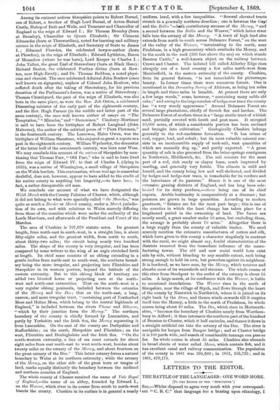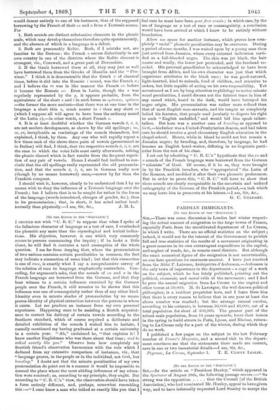LETTERS TO THE EDITOR.
THE BATTLE OF THE LANGUAGES: ONE WORD MORE.
(TO THE EDITOR OF THE " SPECTATOR:)
SIR,—Whilst disposed to agree very much with your correspond- ent "C. B. C." that language has a bearing upon ethnology, I
would demur entirely to one of his instances, that of the supposed borrowing by the French of their en and u from a Teutonic source. For 1. Both sounds are distinct substantive elements in the phonic scale, which may develop themselves therefore quite spontaneously, and the absence of which in a language is a defect.
2. Both are presumably Keltic. Both, if I mistake not, are familiar to the Bretons ; the French u occurs dialectically in our own country in one of the districts where the Keltic element is strongest, viz., Cornwall, and a great part of Devonshire.
3. If the Gauls borrowed them at all, they may just as well have borrowed them from the Greeks of Massilia and the "Pro- since." I think it is demonstrable that the Greek u of classical times, before it slid into the Romaic i sound, was the French u; and I believe the so was in like manner the French en before it became the Romaic ev. Even in Latin, though the u was regularly represented by the y, it appears probable, from the equivalence of the short u and i in such forms as optumus, optima —the former the more ancient—that there was at one time in the language a short thin u, much nearer to i than any short oo (which I suppose all will agree to have been the ordinary sound of the Latin u),—in other words, a short French u.
4. It is at least doubtful whether the German vowels a, 6, ii, are not modern developments, as shown by the old spellings ; ae, oe, en, inexplicable as renderings of the sounds themselves, but explained, I think, by them. Any one who will rapidly repeat a few times each of the above three pairs of vowels (pronounced as in Italian) will find, I think, that the respective sounds a, ö, ii, are the ones to which the voice falls most easily afterwards, solving the phonic discord which in fact results from the frequent repeti- tion of any pair of vowels. Hence I should feel inclined to con- clude that the old spellings really represented the old pronuncia- tion, and that the sounds ii, o, ii, are in German really new (though by no means borrowed) ones,—newer by far than the Frankish conquest.
I should wish it, however, clearly to be understood that I by no means wish to deny the influence of a Teutonic language over the French ; but I believe that is to be sought for rather in the forms of the language (words introduced, changes of gender, 8:c.), than in its pronunciation ; that, in short, it has acted rather intel- lectually than physically.—I am, Sir, 8:c., J. M. L.































 Previous page
Previous page